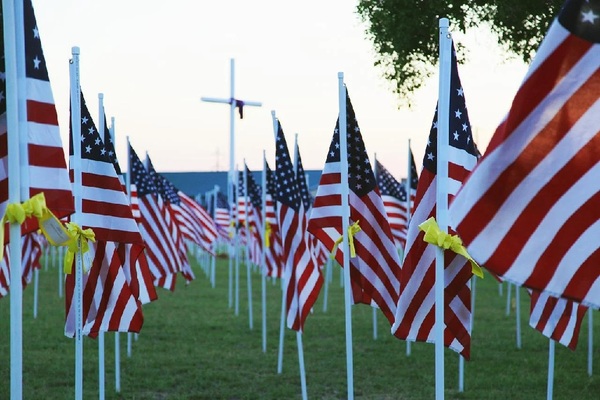
–>
May 30, 2022
Memorial Day is a profound American holiday because it connects the present with so many different points of our past. Originally known as Decoration Day, it was a day set aside to honor those who lost their lives in the Civil War — America’s most costly war, taking the lives of as many as 800,000 men. Among American holidays, Memorial Day is unique also in that it originated from the vanquished, not the victor.
‘); googletag.cmd.push(function () { googletag.display(‘div-gpt-ad-1609268089992-0’); }); }
After the war was over, women from the South — Columbus, Mississippi, and Richmond, Virginia — set out to decorate with flowers the gravesites of their fallen Confederate soldiers. But they became so moved in the process that they decided to equally decorate the gravesites of Union soldiers buried alongside their loved ones. That expression was profound for it showed an amazing forgiveness toward even a merciless Union victor like General William Sherman.
Although Abraham Lincoln could have blamed the South for starting the war by seceding from the United States and firing the first shots on Fort Sumter, he expressed no accusation or bitterness toward the South and held that both sides were to blame for the Civil War. “With malice toward none, with charity for all… let us bind up the nation’s wounds,” said Lincoln in his Second Inaugural Address.
Decoration Day would not become a national holiday for nearly a century, until after the two World Wars and the Korean War cost America another 559,000 lives. During the Vietnam War, Decoration Day was officially renamed Memorial Day to honor all servicemen who died in the line of duty in any war or engagement. It became an official national holiday when Congress passed the Uniform Monday Holiday Act in 1968.
‘); googletag.cmd.push(function () { googletag.display(‘div-gpt-ad-1609270365559-0’); }); }
While remembering those who lost their lives in serving America in wartime is a central purpose of this holiday, Memorial Day takes on its deepest meaning when we connect it with our heritage and roots. A takeaway from the Civil War era is not only acknowledging the magnanimity and quality of character of so many leaders of those earlier times, but also the respect and civility that allowed healing and moving forward as a nation.
One glaring difference between those times and the present is that we have lost much of the civility that facilitated keeping our diverse peoples together in earlier times. The qualities of character and societal norms shaped by Christian influence that were taken for granted through the mid-20th Century — which included grace, respect, tolerance, and manners — have been increasingly crowded out by a coarse secular culture, and more recently by the legions of woke whose religious fervor has added to the aforementioned a judgmental closed-mindedness and loss of spontaneity, humor, and joy.
The deepest meaning of Memorial Day can be found in simply remembering that when Americans sacrificed their lives in military service, it was not just to defend the United States, but it was also to uphold the natural God-given rights of all people that were articulated in the nation’s founding documents, which established a government of the people, by the people and for the people. As a result, America became an inspiration for others around the world… Some likened America to being a light to world, like a city on a hill that cannot be hidden.
One cannot help feeling that America’s light has dimmed this Memorial Day 2022 with our country’s leadership losing its way on many fronts and even betraying the people. So, it is fitting to reflect on our past and rediscover the threads that not only hold us together, but also provide strength to the patchwork of our national fabric to withstand the storms ahead.
A discussion of Memorial Day would not be complete without appreciating the significance of the Tomb of the Unknown Soldier, formally established on what was then known as Armistice Day, three years after the end of World War I. The Congress had approved the burial of an unidentified American soldier who had fallen somewhere on a battlefield in France at Arlington National Cemetery in Virginia.
The Tomb of the Unknown Solider came to be recognized as the most hallowed grave at Arlington Cemetery — the most sacred military cemetery in the United States. And here, one of the profound ironies of our history is that this hallowed and sacred ground came from vanquished Confederate general Robert E. Lee, who despite his defeat in leading the Confederate cause in the Civil War, ended up with the highest unrecognized national honor. That honor unexpectedly came from the loss of being forced to give up his family’s Arlington House plantation, which he and his wife forfeited to the federal government after they sided with Virginia and the South. The 1,100 acres of that seized plantation land would later become the Arlington Cemetery, providing a final resting place for future patriots who gave their lives for the cause of freedom and the American republic.
‘); googletag.cmd.push(function () { googletag.display(‘div-gpt-ad-1609268078422-0’); }); } if (publir_show_ads) { document.write(“
 The selection process for the World War II Unknown proved more difficult than that of World War I since American soldiers had fought on three continents. Then the process was interrupted by the Korean War, which resulted in numerous deaths who could not be identified. Finally on May 28, 1958, caskets bearing the Unknowns of World War II and the Korean War arrived in Washington. The caskets were rotated such that each unknown serviceman rested on the “Lincoln catafalque,” a raised platform that held President Lincoln’s casket in April 1865. Two days later on May 30, then the official date of Memorial Day, those Unknowns were transported to Arlington Cemetery, where they were interred in the plaza beside their World War I comrade.
The selection process for the World War II Unknown proved more difficult than that of World War I since American soldiers had fought on three continents. Then the process was interrupted by the Korean War, which resulted in numerous deaths who could not be identified. Finally on May 28, 1958, caskets bearing the Unknowns of World War II and the Korean War arrived in Washington. The caskets were rotated such that each unknown serviceman rested on the “Lincoln catafalque,” a raised platform that held President Lincoln’s casket in April 1865. Two days later on May 30, then the official date of Memorial Day, those Unknowns were transported to Arlington Cemetery, where they were interred in the plaza beside their World War I comrade.
The Vietnam War Unknown was identified in 1998 as Lt. Michael J. Blassie. Afterward, with so many “missing in action” in the Vietnam War, it was decided that the crypt designated Unknown for that war would remain empty. It was rededicated to honor all missing U.S. service members from the Vietnam War on September 17, 1999, with the inscription on the crypt reading, “Honoring and Keeping the Faith with America’s Missing Servicemen, 1958-1975.”
The inscribed words on the Tomb of the Unknown Soldier of “Here Rests in Honored Glory an American Soldier Known but to God” are an uplifting reminder that all those who died for the American cause should have a special place in our hearts as they do in God’s. Anyone who visits the Tomb of the Unknown Soldier, which is guarded 24 hours a day, 365 days a year regardless of weather by special armed Tomb Guard sentinels cannot but be humbled and even tearfully reminded of what Lincoln said at Gettysburg, “…that from these honored dead we take increased devotion to that cause for which they gave the last full measure of devotion — that we here highly resolve that these dead shall not have died in vain — that this nation, under God, shall have a new birth of freedom — and that government of the people, by the people, for the people, shall not perish from the earth.”
Memorial Day reminds us that U.S. military personnel are asked to put their lives on the line. Defending the nation and fighting wars is the most serious and important job of all. We have to acknowledge also that there has been inept political and military leadership, such as what led up to throwing away a long and hard-fought victory in Iraq by withdrawing all U.S. forces in 2011, enabling the rise of ISIS; and the hasty retreat from Afghanistan in August 2021, which unnecessarily cost 13 American Marines and left behind some $83 billion of U.S. military equipment in what was effectively a surrender to the Taliban. Similarly, there should be zero tolerance of policies or programs that divide and demoralize our troops such as Critical Race Theory indoctrination, which has been the willful policy choice of President Biden’s Secretary of Defense and Chairman of the Joint Chiefs of Staff.
In sum, Memorial Day this year takes on a greater twofold meaning than it has previously. We are called to remember those who died in military service to the country and recommit to the conviction that those lives lost shall never be in vain. Equally important, we should remember and deepen our appreciation of a heritage that began with a courageous, brilliant, and faithful group of founders and those that followed who were willing to give their lives to establish, preserve and protect the United States and what is stands for.
While many of us now feel that the light from the City on a Hill has grown dim, our Constitution still stands, and we the people are still in charge. In the face of internal and external enemies seeking our demise, we cannot falter or retreat, for we have much to do. Let us go forward with the biblical admonition that “if my people, who are called by my name, will humble themselves and pray and seek my face and turn from their wicked ways, then I will… forgive their sin and will heal their land.”
Scott S. Powell is senior fellow at Discovery Institute. His new book, Rediscovering America, has been #1 Amazon New Release in the history genre for eight weeks. Found here at https://www.amazon.com/dp/1637581599. Reach him at scottp@discovery.org
Image: Pixabay
<!– if(page_width_onload <= 479) { document.write("
“); googletag.cmd.push(function() { googletag.display(‘div-gpt-ad-1345489840937-4’); }); } –> If you experience technical problems, please write to helpdesk@americanthinker.com
FOLLOW US ON
<!–
–>
<!– _qoptions={ qacct:”p-9bKF-NgTuSFM6″ }; ![]() –> <!—-> <!– var addthis_share = { email_template: “new_template” } –>
–> <!—-> <!– var addthis_share = { email_template: “new_template” } –>




